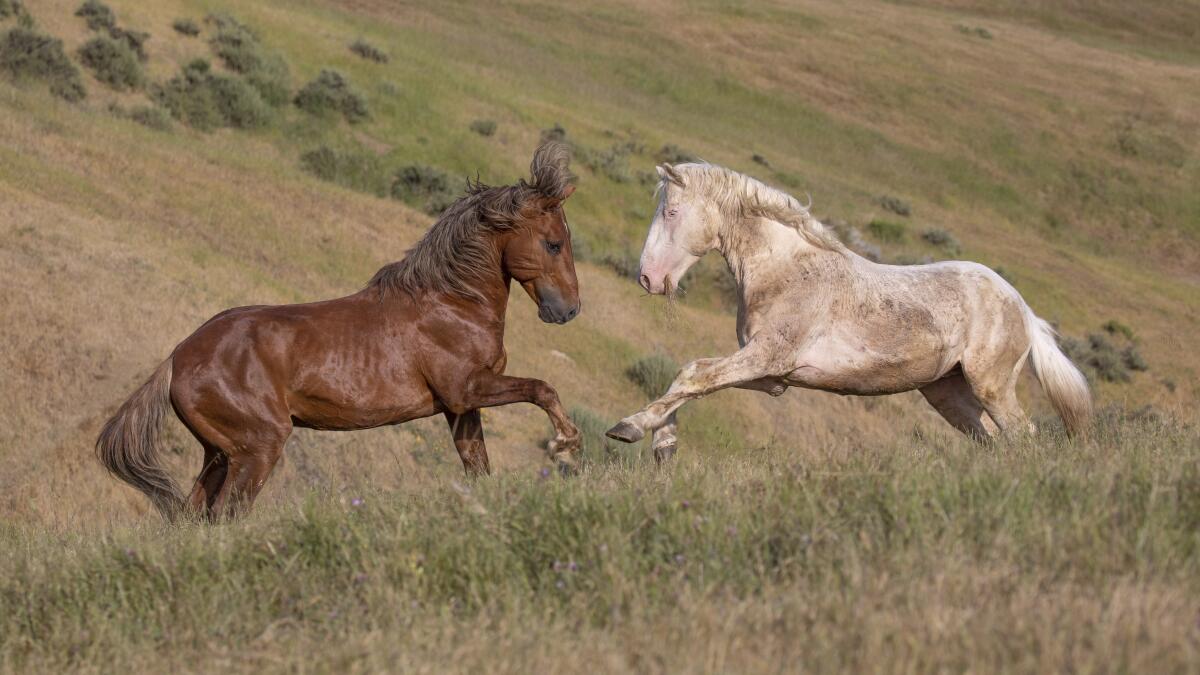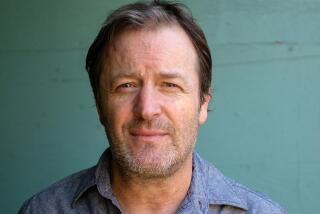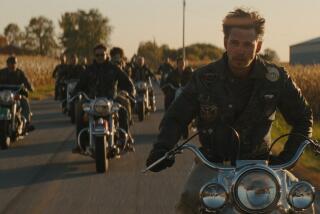Review: ‘The Mustangs: America’s Wild Horses’ lacks the requisite horsepower

The Times is committed to reviewing theatrical film releases during the COVID-19 pandemic. Because moviegoing carries risks during this time, we remind readers to follow health and safety guidelines as outlined by the Centers for Disease Control and Prevention and local health officials.
For a documentary called “The Mustangs: America’s Wild Horses,” co-directors Steven Latham and Conrad Stanley take a decidedly tame look at the past and present of our nation’s wild horse population, which is currently estimated at nearly 90,000.
Although the film doesn’t shy away from some of the historically harder truths about the treatment and fates of the mustangs that have roamed the Western U.S. for centuries, it presents its facts in such a largely gentle, uplifting package that it’s hard to get too charged up about the issues at hand.
Better, it seems, to sit back and take in the majesty of our equine friends and the gorgeous open spaces they call home and appreciate the animals’ many kindly, stalwart advocates who help tell their stories.
All this by way of saying that “Mustangs,” which was shot in California, Wyoming, Texas, Colorado and elsewhere, is a lovely, essential portrait that’s also a little dull. It sometimes feels more like a promotional film than penetrating documentary.
A host of starry names are attached here, including executive producers Robert Redford (he narrates the opening and close), singer Patti Scialfa Springsteen and daughter Jessica Springsteen; and co-producer Diane Warren, the prolific songwriter whose “Never Gonna Tame You” is performed here by Blanco Brown. Bruce Springsteen, Willie Nelson and Emmylou Harris also sing equine-centric tunes over lyrical montages.
But it’s the lesser-known folks — horse trainers, animal activists, wildlife photographers — who have the most to say about the mustangs’ place in the world, with author David Philipps (“Wild Horse Country”) offering earnest, insightful commentary via a lengthy interview woven throughout the film.
Such vital support groups as Operation Wild Horse, the Mustang Heritage Foundation, the Wyoming Wild Horse and Burro Program, and SWAT (Sand Wash Basin Wild Horse Advocate Team) get their close-ups as we learn about the various actions that reduce mustang population growth, pair soul-healing horses with PTSD-affected veterans and prepare mustangs for adoption or purchase.
Another inspiring sequence spotlights the late Velma “Wild Horse Annie” Johnston, a longtime mustang activist whose galvanizing efforts led to the passage of the 1971 Wild Free-Roaming Horse and Burro Act. The landmark ecological measure, which protected wild horses and burros on designated federal lands, was signed into law by then-President Richard Nixon. (Yes, he did.)
Latham, who also produced, and Stanley, who also served as editor, include memorable bits of archival footage and vintage photos that help remind us how long the mustangs have been an integral symbol of American freedom and independence — not to mention the namesake of a game-changing sports car.
'The Mustangs: America’s Wild Horses'
Not rated
Running time: 1 hour, 30 minutes.
Playing: Starts Oct. 15, Laemmle Monica, Santa Monica; Laemmle Newhall, Santa Clarita
More to Read
Only good movies
Get the Indie Focus newsletter, Mark Olsen's weekly guide to the world of cinema.
You may occasionally receive promotional content from the Los Angeles Times.










